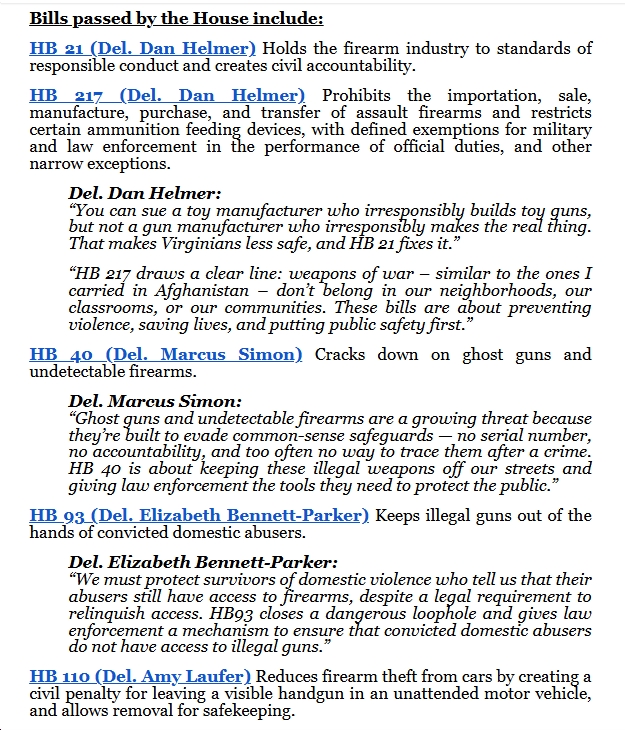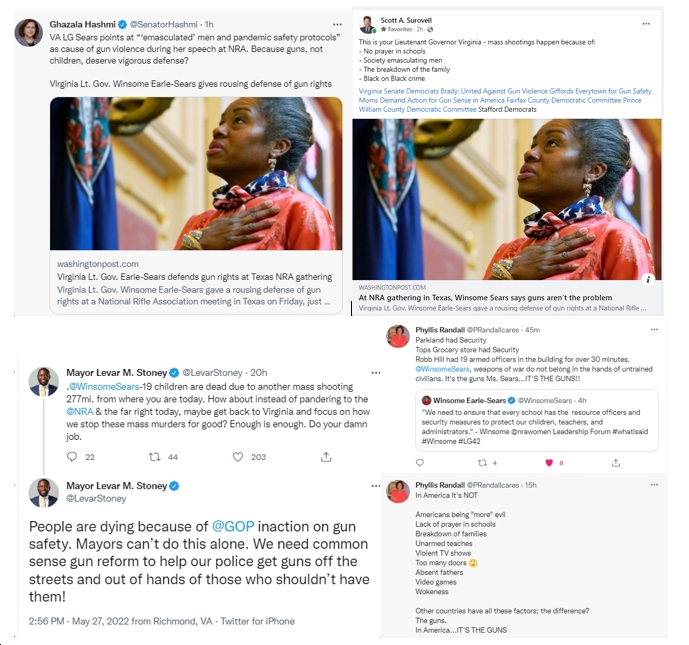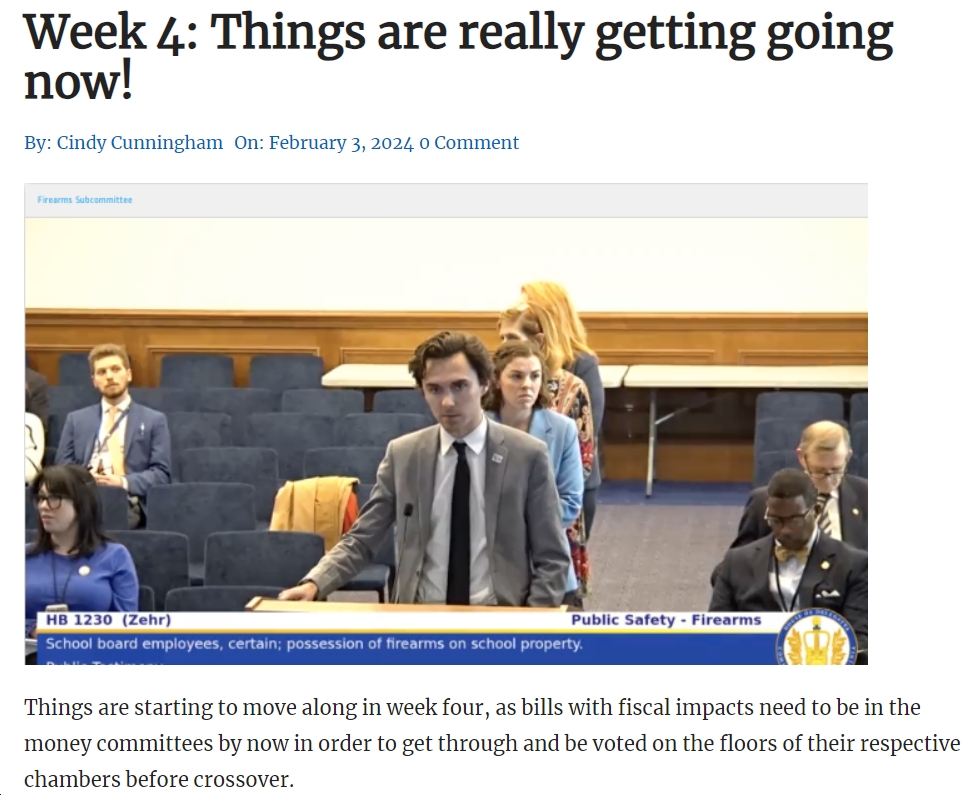Interesting post by Charlottesville City Council Member-elect Lloyd Snook, a brilliant attorney and “a frequent analyst for local and national television stations on matters involving criminal and constitutional law.”
Long post warning…
Delegate Jay Jones of Norfolk has asked for an Attorney General’s opinion about the sudden move toward counties declaring themselves “Second Amendment Sanctuaries.” I have attached a copy of his letter.
This is a purely political move — not a legal move; the “Second Amendment Sanctuary” resolutions are vague responses to bills that haven’t even been written yet, much less passed. And the letter requests an opinion but doesn’t state the precise question for which it seeks an answer.
These “Second Amendment Sanctuary” resolutions suddenly began appearing about a week after the Democrats won majorities in both the House of Delegates and the Senate.
The resolutions differ in substance from county to county.
The first such resolution actually passed back in June, 2019, in Carroll County. That resolution expressed the intent of the Supervisors that “public funds of the County not be used to restrict Second Amendment rights or to aid in the unnecessary and unconstitutional restriction of the rights under the Second Amendment of the citizens of Carroll County to bear arms.” This was in the month before Governor Northam’s July special legislative session to address gun violence. That session ended abruptly when the Republican-dominated (pre-November election) General Assembly adjourned after 90 minutes, without action.
Two days after the November 5 election, Campbell County kicked off the movement by adding to the County’s list of proposed legislation a request to its representatives to defend citizens’ Second Amendment rights, and to oppose laws aimed at what county leaders call law-abiding gun owners.
The following week, Charlotte County passed a resolution that is fairly typical of the other resolutions that have passed in other counties; after a lot of “Whereas” clauses, the guts of the resolution stated:
“That the Board of Supervisors hereby expresses its intent to uphold the Second Amendment rights of the citizens of Charlotte County, Virginia, and its intent that public funds of the County not be used to restrict Second Amendment rights or to aid in the unnecessary and unconstitutional restriction of the rights under the Second Amendment of the citizens of Charlotte County, Virginia to bear arms; and
“That the Board of Supervisors hereby declares its intent to oppose unconstitutional restrictions on the right to keep and bear arms through such legal means as may be expedient, including without limitation court action; and,
“That the Board of Supervisors hereby declares Charlotte County, Virginia, as a ‘Second Amendment Sanctuary.'”
Let’s pull that apart for a moment.
No governing body should express a contrary intent — an intent to violate the Constitutional rights of a citizen. No governing body should express its intent to enforce unconstitutional laws, whether those laws try to restrict gun rights or abortion rights. No governing body should appropriate funds for the purpose of enforcing unconstitutional legislation.
These resolutions do not promise to refuse to enforce constitutional gun restrictions. (If a resolution calls for refusing to enforce a constitutional restriction, I am not aware of it.)
The problem is that the NRA and Second Amendment enthusiasts don’t think that ANY gun restrictions are constitutional — even though their patron saint, Antonin Scalia, suggested the Second Amendment might not apply to anything with a firepower greater than a 1789 musket.
Then under what circumstances would such a resolution have any effect?
Suppose the General Assembly were to re-adopt the one-gun-a-month law that Virginia had in effect from 1993 to 2012. This kind of legislation was enacted to end the common practice of gun runners buying a large quantity of guns at retail and then taking them to states like New York that had stricter gun laws to sell, usually on the street.
If FB had a footnote feature, I would add a footnote here — A similar law in D.C. prohibited registering more than one handgun a month. This “one-handgun-a-month” registration requirement was struck down under the Second Amendment by a federal appeals court in a case known as Heller III. The court did not rule that such a requirement would always be unconstitutional, but determined that the District had not presented adequate evidence to justify its 30-day registration limit on public safety grounds. Heller v. District of Columbia, (“Heller III”), 801 F.3d 264, 279-80 (D.C. Cir. 2015). This litigation did NOT result in a holding that there was some absolute right to possess firearms. The Court upheld firearms registration provisions, applying a test that weighed the justification for the rule against the cost or inconvenience of compliance. And the Court did NOT say that a “one-handgun-a-month” rule is per se unconstitutional — only that the government had not presented enough evidence to support it.
So let’s assume that the Democratic General Assembly re-enacted this provision. The NRA would immediately file for an injunction prohibiting its enforcement statewide, and they would probably be granted an injunction. So the Sheriff of Charlotte County would not have any enforcement of this rule until a court had declared it to be constitutional — in which case, according to the terms of the resolution, the public policy of Charlotte County would be to enforce the law, because the resolution only calls for not enforcing unconstitutional laws.
So now we come back to Delegate Jones’ request for a formal Attorney General’s opinion.
What is a “formal Attorney General’s opinion”? It is NOT a political document. It is not the position that the Attorney General has taken in a court case. It is supposed to provide guidance to public officials on matters that haven’t yet been decided by courts. It is not Mark Herring’s opinion on a matter of public policy — it is advice from the top legal advisor to government officials on how to perform their duties.
An AG opinion is NOT law. The courts have said that it is not binding on any court or on any public official, but it may be seen as persuasive authority if the opinion relates to some issue on which the AG’s office has particular and unique competence. An example of that last criterion would be some of the opinions that have been rendered on technical questions of how local bonds are to be issued, or on some small tax question. This is an area where the issue would never get to court, because if there was some question of how bonds were to be issued, they simply wouldn’t be issued, so there would never be a test case. But there are attorneys in the local government section of the AG’s office who have immersed themselves in this technical stuff, and they are presumed to know their stuff — certainly more so than the City Attorney of Podunk, Virginia, who has probably never seen the question come up before. So if the City Attorney of Podunk, Virginia, asks the AG’s office for a formal opinion on a technical question, that opinion is almost surely going to be accepted as The Law on that point. And if some years go by after the AG’s opinion without the General Assembly amending the statute to address the issue, everyone pretty much accepts that opinion as The Law.
Contrast that with a decision that Mark Herring made in 2014 to stop fighting gay marriage cases. That decision was clearly an expression of Herring’s belief in the state of the constitutional law, but it was NOT a “formal Attorney General’s opinion.” His expression that the applicable constitutional law had changed so that there was no constitutional bar to gay marriage was nothing more than the expression of opinion by one litigant.
So what is Attorney General Herring supposed to do with Jay Jones’ request for a formal opinion? First, look at the letter requesting the opinion. Can you find a “question presented”? I can’t. A typical request will include a specific question, and it will usually be the result of negotiation with the AG’s office before it is submitted to make sure that it is presented in a way that it CAN be answered. The request will almost always be expressed with a “whether” statement — “You ask whether a member of the Board of Supervisors can…” Delegate Jones’ letter does not contain a “whether” question, but rather invites AG Herring to express his “stance” on “Second Amendment Sanctuary” resolutions. Not a particular resolution, mind you, but on the whole topic.
If the AG’s office agrees to respond, their response will be:
1. All governments, including local governments, have a duty to enforce constitutional state laws.
2. All state laws are presumed to be constitutional, and must be enforced by local governments unless a court of competent jurisdiction issues an injunction prohibiting enforcement.
3. If an injunction is issued by a court prohibiting enforcement of a state law, the local government should not enforce it.
4. We answer specific questions; we don’t engage in political punditry. So #1-3 are all you’re going to get from us.
So why would Delegate Jones even bother with this request? I can think of three reasons, all political.
1. This “Second Amendment Sanctuary” business is proving to be a great organizing tool and rallying cry for Republicans, who are feeling somewhat under the gun from trying to defend President Trump. I think Delegate Jones would like to be able to give a little pushback.
2. Democrats are feeling a lot of pressure on guns heading into the General Assembly session. It feels a little like the summer of 2009, when Americans for Prosperity were showing up at town halls across the state to campaign against health care reform. A favorable AG opinion might give Democrats a little support.
3. Now here I am going to get wildly speculative. Delegate Jones is one of a cadre of young black GA members. One of his compatriots, Jennifer McClellan, is thought to be running for Governor, as is Mark Herring. If Delegate Jones is supporting Jennifer McClellan for Governor, it might be fun to put AG Herring in a bad spot for the 2021 primary. Suppose Senator McClellan is out there pushing for gun legislation, wracking up brownie points with Democratic Primary voters, while AG Herring is having to give the legally correct but politically unsatisfying answer above, and probably pissing everyone off, no matter what he does … It would not be the first time that someone handed another candidate a political hot potato.



















